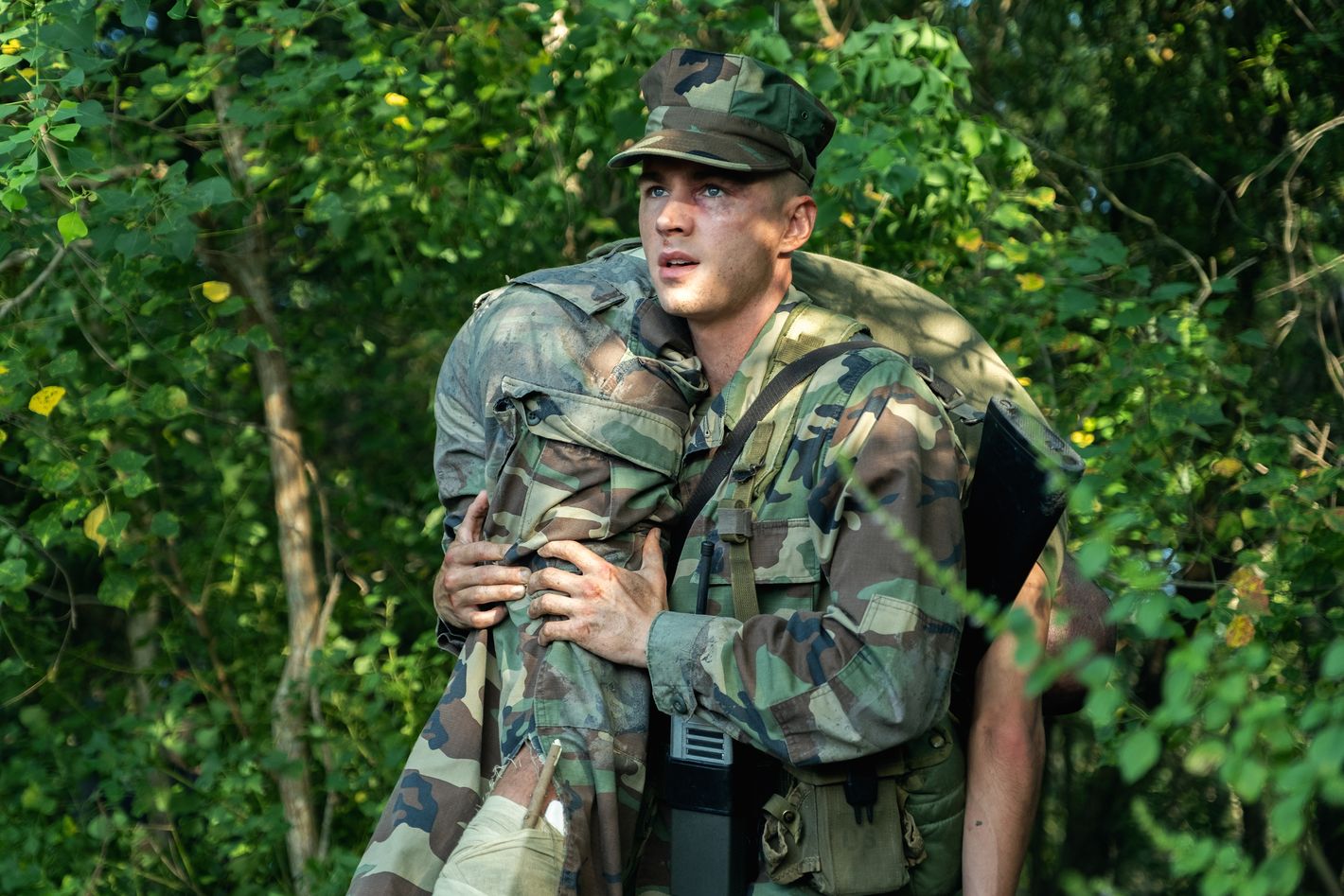
Spoilers for all eight episodes of Boots on Netflix.
For a series about a closeted 18-year-old who enlists in the Marines before “Don’t Ask, Don’t Tell,” Boots takes the process of joining the military very seriously. Based on the memoir The Pink Marine by Greg Cope White, the series follows a twink (Miles Heizer, who has been playing a teen since Parenthood) who impulsively signs up for basic training alongside the straight friend he has a crush on. Boots plays out like a comedy about summer camp — our hero suffers through drills, builds a bond with his brothers in arms, and learns to muscle through hardship — and argues that the brutality of military training can make you a better man. It’s a wild thesis, and I admit I kept watching only because I was waiting for Boots to upend it. After viewing the whole season, I’m only more confused.
Boots, to its credit, doesn’t retread the coming-out tropes of mass-market gay media. Cameron “Cope” knows he’s gay from the start, but the character is written to be implausibly and hilariously oblivious about what being a gay Marine will entail. There is a lot of overexplanatory dialogue, presumably to familiarize a 2025 audience with the politics of the early ’90s. When Cope first considers joining up, he asks a friend, “Did you know it’s illegal to be gay in the military?” To which his friend responds, “Yeah, it’s messed up.” He leaps into basic training and gets his head shaved — which, by the way, makes it difficult to tell all these pretty actors apart — but fumbles through the training exercises and hazing rituals, including cruelties and homophobia from the other recruits (because this is Netflix, they can say “faggot”). Cope manages his feelings by talking to an imaginary version of himself who is cattier and more fey, but once he starts to get a better handle on training, he fantasizes about himself as a lathered-up Rambo type holding a machine gun. Ah yes, that’s a real man.
Cope sees an actual version of this “real” man in Sergeant Sullivan (Max Parker), an older character who is trying to hide his past. There are melodramatic flashbacks to a love affair he had in Guam, but he, like Cope, clings desperately to the meaning he’s found in being a Marine. The heartbreak for him is that a bad rule might disqualify him from service, not that the system itself might be bad. “Girl,” I kept saying to my screen, “get yourself out of there. You could make so much more money standing outside an Abercrombie.” Similarly, Cope falls for a new recruit, Jones (Jack Cameron Kay), who is ambivalent about being a Marine and looks like he enlisted from the field office in Bushwick, but Boots presents him as a distraction from the serious work of becoming a good solider. The two of them flirt, but of course the affair is not consummated, and Sergeant Sullivan pits them against each other in a punch-out exercise. He seems to be subliminally jealous of Jones, a dynamic that’s extremely sexually charged and, of course, underexplored.
That’s because Boots refuses to engage with actual sex. Netflix’s homepage and social-media accounts tease a series full of shirtless hunks, and the characters often shower together, showing off their butts. The audience is free to ogle beefcake, but Cope doesn’t get any action. He doesn’t even know what lube is! It’s a fascinatingly repressed dynamic. You have to imagine that, stuck together in an intense environment, these men must have been hooking up, regardless of whether they thought of themselves as straight. But Boots is like a Marvel movie: Everyone has a chiseled body but nobody is ever horny, a nifty.org story with all the fucking edited out. It’s a baffling dodge away from engaging with what it must have been like to be gay during that era, as if Boots believes a straight Establishment would be fine with gay people as long as we keep our kinks to ourselves. The show is happy to make winking jokes about how gay boot camp is — Cope and his love interest share a laugh about how they have to call their shirts “blouses” — but plugs its ears to larger historical context. Wouldn’t a lot of casual homophobia in 1990 be rooted in the terror of AIDS? There’s a whole history, actually, of how the Pentagon responded to the epidemic within its ranks, first by imprisoning infected men. Then, when the rate of infection was higher than expected, it instituted rules stating that you couldn’t be discharged for having the virus and that a diagnosis could remain confidential (setting the stage, in turn, for something like “don’t ask, don’t tell”). You won’t hear about that here. Boots seems to exist in 1990 primarily for the needledrops.
The show does try to complicate its assertions about masculinity, with plotting that feels very much like 2020s mainstream liberal discourse: Cope’s sensitivity is part of his strength, and an overweight character can find his own way, too. In one jarring development the show’s tone has no idea how to contain, a recruit dies of exhaustion while pushing himself too hard. But the takeaway is, always, to make moderate adjustments to the same ideals: There are multiple ways to be strong and masculine, and Boots never considers that masculinity itself might need an overhaul. The series even goes out of its way to sweep away criticism of the military. In an early episode, a Black recruit tells Cope that, even though his parents think of it as another tool for oppression, he prefers to “fight for change my own way” and that if he wants to run for office later on, being a soldier will make for a great entry on his résumé. Ah, yes, before you dismantle the system, invest all your time and effort into climbing its ladder.
Boots works hard to insist that while there might be a few bad apples along the way, there’s noble work to be done in the armed forces. I’m sure the discipline of training works for some people’s psychology, but Cope is so naïve and the show is so unwilling to build toward a larger critique that Boots comes off as propaganda. The Pentagon has, of course, already condemned the show as “woke garbage,” which sums up the problem — you’re never going to make bigots happy, so why bother arguing on their terrain about how gay men can be real warriors too? The characters talk about the weight of what men carry in their pack, but not in detail about the trauma of seeing action or what the U.S. military actually gets up to in the outer world — as if it’s just a Tough Mudder competition, not a billion-dollar institution wreaking havoc halfway across the globe. Until the last few minutes of the season, when, I kid you not, Cope happens to catch a news broadcast that announces a war breaking out in Iraq. In season two, we’re going to the Persian Gulf!


